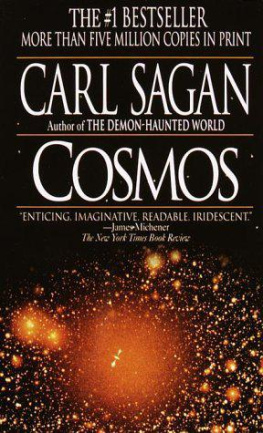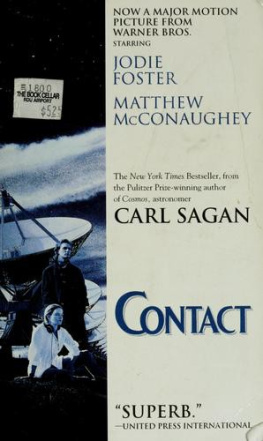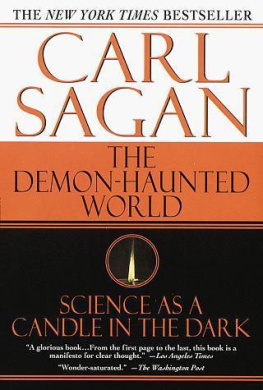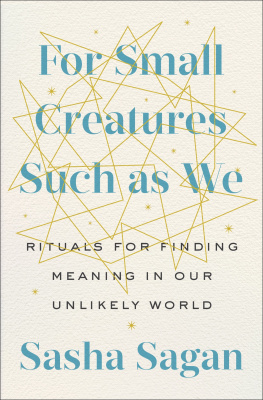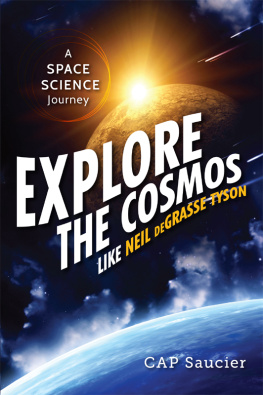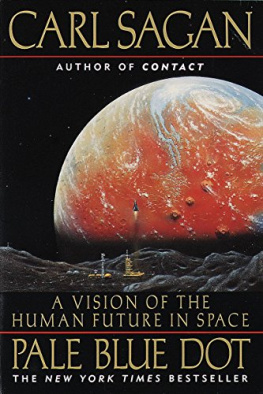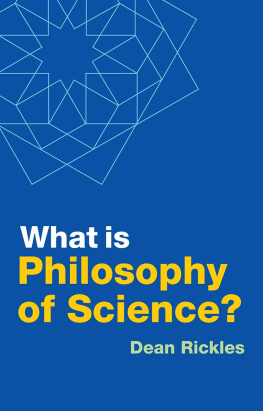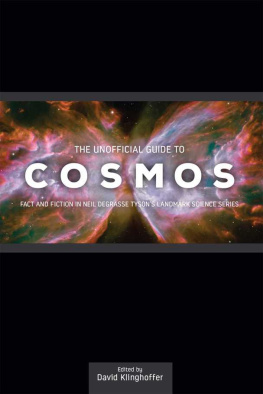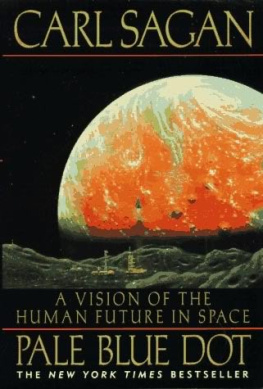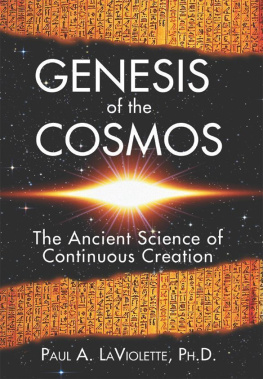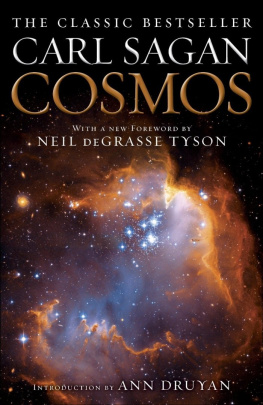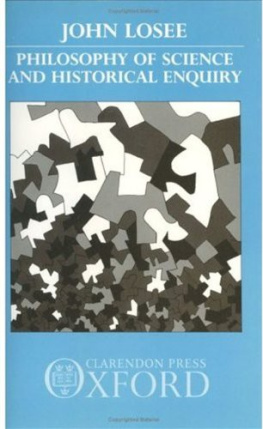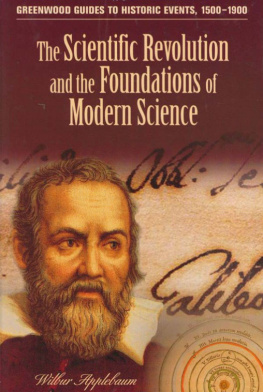Sagan - Cosmos
Here you can read online Sagan - Cosmos full text of the book (entire story) in english for free. Download pdf and epub, get meaning, cover and reviews about this ebook. year: 1985, publisher: RANDOM HOUSE-UK, genre: Religion. Description of the work, (preface) as well as reviews are available. Best literature library LitArk.com created for fans of good reading and offers a wide selection of genres:
Romance novel
Science fiction
Adventure
Detective
Science
History
Home and family
Prose
Art
Politics
Computer
Non-fiction
Religion
Business
Children
Humor
Choose a favorite category and find really read worthwhile books. Enjoy immersion in the world of imagination, feel the emotions of the characters or learn something new for yourself, make an fascinating discovery.
Cosmos: summary, description and annotation
We offer to read an annotation, description, summary or preface (depends on what the author of the book "Cosmos" wrote himself). If you haven't found the necessary information about the book — write in the comments, we will try to find it.
SUMMARY:
The best-selling science book ever published in the English language, COSMOS is a magnificent overview of the past, present, and future of science. Brilliant and provocative, it traces todays knowledge and scientific methods to their historical roots, blending science and philosophy in a wholly energetic and irresistible way.
Sagan: author's other books
Who wrote Cosmos? Find out the surname, the name of the author of the book and a list of all author's works by series.
Cosmos — read online for free the complete book (whole text) full work
Below is the text of the book, divided by pages. System saving the place of the last page read, allows you to conveniently read the book "Cosmos" online for free, without having to search again every time where you left off. Put a bookmark, and you can go to the page where you finished reading at any time.
Font size:
Interval:
Bookmark:
CARL SAGAN
Cosmos
The story of fifteen billion years of cosmic evolution transforming matter and life into consciousness, of how science and civilization grew up together, and of the forces and individuals who helped shape modern science. A story told with Carl Sagans remarkable ability to make scientific ideas both comprehensible and exciting, based on his acclaimed television series.
For Ann Druyan
In the vastness of space and the immensity of time,
it is my joy to share
a planet and an epoch with Annie
Carl Sagan was the Director of the Laboratory for Planetary studies and David Duncan Professor of Astronomy and Space Sciences at Cornell University. He played a leading role in the Mariner, Viking and Voyager expeditions to the planets, for which he received the NASA medals for Exceptional Scientific Achievement and for Distinguished Public Service, and the international astronautics prize, the Prix Galabert.
He served as Chairman of the Division for Planetary Sciences of the American Astronomical Society, as Chairman of the Astronomy Section of the American Association for the Advancement of Science, and as President of the Planetology Section of the American Geophysical Union. For twelve years, he was Editor-in-Chief of Icarus , the leading professional journal devoted to planetary research. In addition to four hundred published scientific and popular articles, Dr Sagan was the author, co-author or editor of more than a dozen books, including Intelligent Life in the Universe , The Cosmic Connection , The Dragons of Eden , Murmurs of Earth , Brocas Brain and the bestselling science fiction novel, Contact .
He was a recipient of the Joseph Priestly Award for distinguished contributions to the welfare of mankind, and the Pulitzer Prize for literature.
Carl Sagan died in December 1996.
INTRODUCTION
The time will come when diligent research over long periods will bring to light things which now lie hidden. A single lifetime, even though entirely devoted to the sky, would not be enough for the investigation of so vast a subject... And so this knowledge will be unfolded only through long successive ages. There will come a time when our descendants will be amazed that we did not know things that are so plain to them... Many discoveries are reserved for ages still to come, when memory of us will have been effaced. Our universe is a sorry little affair unless it has in it something for every age to investigate... Nature does not reveal her mysteries once and for all.
- Seneca, Natural Questions ,
Book 7, first century
In ancient times, in everyday speech and custom, the most mundane happenings were connected with the grandest cosmic events. A charming example is an incantation against the worm which the Assyrians of 1000 B.C. imagined to cause toothaches. It begins with the origin of the universe and ends with a cure for toothache:
After Anu had created the heaven,And the heaven had created the earth,And the earth had created the rivers,And the rivers had created the canals,And the canals had created the morass,And the morass had created the worm,The worm went before Shamash, weeping,His tears flowing before Ea:What wilt thou give me for my food,What wilt thou give me for my drink?I will give thee the dried figAnd the apricot.What are these to me? The dried figAnd the apricot!Lift me up, and among the teethAnd the gums let me dwell! ..Because thou hast said this, O worm,May Ea smite thee with the might ofHis hand!(Incantation against toothache.)
Its treatment: Second-grade beer... and oil thou shalt mix together;The incantation thou shalt recite three times thereon and shalt put the medicine upon the tooth.
Our ancestors were eager to understand the world but had not quite stumbled upon the method. They imagined a small, quaint, tidy universe in which the dominant forces were gods like Anu, Ea, and Shamash. In that universe humans played an important if not a central role. We were intimately bound up with the rest of nature. The treatment of toothache with second-rate beer was tied to the deepest cosmological mysteries.
Today we have discovered a powerful and elegant way to understand the universe, a method called science; it has revealed to us a universe so ancient and so vast that human affairs seem at first sight to be of little consequence. We have grown distant from the Cosmos. It has seemed remote and irrelevant to everyday concerns. But science has found not only that the universe has a reeling and ecstatic grandeur, not only that it is accessible to human understanding, but also that we are, in a very real and profound sense, a part of that Cosmos, born from it, our fate deeply connected with it. The most basic human events and the most trivial trace back to the universe and its origins. This book is devoted to the exploration of that cosmic perspective.
In the summer and fall of 1976, as a member of the Viking Lander Imaging Flight Team, I was engaged, with a hundred of my scientific colleagues, in the exploration of the planet Mars. For the first time in human history we had landed two space vehicles on the surface of another world. The results, described more fully in Chapter 5, were spectacular, the historical significance of the mission utterly apparent. And yet the general public was learning almost nothing of these great happenings. The press was largely inattentive; television ignored the mission almost altogether. When it became clear that a definitive answer on whether there is life on Mars would not be forthcoming, interest dwindled still further. There was little tolerance for ambiguity. When we found the sky of Mars to be a kind of pinkish-yellow rather than the blue which had erroneously first been reported, the announcement was greeted by a chorus of good-natured boos from the assembled reporters - they wanted Mars to be, even in this respect, like the Earth. They believed that their audiences would be progressively disinterested as Mars was revealed to be less and less like the Earth. And yet the Martian landscapes are staggering, the vistas breathtaking. I was positive from my own experience that an enormous global interest exists in the exploration of the planets and in many kindred scientific topics - the origin of life, the Earth, and the Cosmos, the search for extraterrestrial intelligence, our connection with the universe. And I was certain that this interest could be excited through that most powerful communications medium, television.
My feelings were shared by B. Gentry Lee, the Viking Data Analysis and Mission Planning Director, a man of extraordinary organizational abilities. We decided, gamely, to do something about the problem ourselves. Lee proposed that we form a production company devoted to the communication of science in an engaging and accessible way. In the following months we were approached on a number of projects. But by far the most interesting was an inquiry tendered by KCET, the Public Broadcasting Services outlet in Los Angeles. Eventually, we jointly agreed to produce a thirteen-part television series oriented toward astronomy but with a very broad human perspective. It was to be aimed at popular audiences, to be visually and musically stunning, and to engage the heart as well as the mind. We talked with underwriters, hired an executive producer, and found ourselves embarked on a three-year project called Cosmos . At this writing it has an estimated worldwide audience of 140 million people, or 3 percent of the human population of the planet Earth. It is dedicated to the proposition that the public is far more intelligent than it has generally been given credit for; that the deepest scientific questions on the nature and origin of the world excite the interests and passions of enormous numbers of people. The present epoch is a major crossroads for our civilization and perhaps for our species. Whatever road we take, our fate is indissolubly bound up with science. It is essential as a matter of simple survival for us to understand science. In addition, science is a delight; evolution has arranged that we take pleasure in understanding - those who understand are more likely to survive. The Cosmos television series and this book represent a hopeful experiment in communicating some of the ideas, methods and joys of science.
Next pageFont size:
Interval:
Bookmark:
Similar books «Cosmos»
Look at similar books to Cosmos. We have selected literature similar in name and meaning in the hope of providing readers with more options to find new, interesting, not yet read works.
Discussion, reviews of the book Cosmos and just readers' own opinions. Leave your comments, write what you think about the work, its meaning or the main characters. Specify what exactly you liked and what you didn't like, and why you think so.

